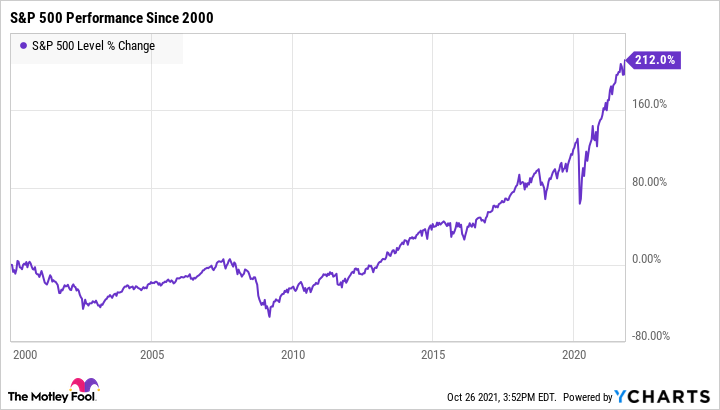It's no secret that the stock market is prone to volatility, and it can be intimidating to invest when a market downturn could be just around the corner.
While some investors believe a market crash may be looming, nobody knows for certain when or if a downturn will occur. The stock market can be unpredictable, and determining exactly when stock prices will fall is nearly impossible.
That said, if a downturn is on the horizon, there are ways to protect your savings. With these three strategies, you can ensure your investments will survive even the worst market crashes.

Image source: Getty Images.
1. Don't pull your money out of the market
When stock prices begin to fall, it may seem like the logical response is to pull your money out of the market immediately. However, that can sometimes do more harm than good.
Market volatility may be alarming, but it's normal. Stock prices rise and fall every day, and some days they increase or decrease more than usual. Sometimes, they may even fall for several days in a row. However, that doesn't necessarily mean a crash is coming. In many cases, stock prices will bounce back as quickly as they fell.
If you sell your stocks after prices have fallen, and then those stocks immediately recover, you'll miss out on those earnings. In addition, by selling when prices are lower, you may lose money on your investments by selling for less than you paid for your stocks.
Because the market can be unpredictable, nobody can know for sure whether a crash is coming until it's already here. By then, stock prices will have fallen considerably, and withdrawing your money will only lock in your losses. It's far better, then, to simply hold your investments regardless of what the market does.
2. Focus on quality long-term investments
It's much easier to hold your investments through tough times when your portfolio is full of strong stocks. Healthy companies are more likely to survive volatility, meaning there's a better chance their stock prices will rebound when the market eventually recovers.
Right now is the perfect opportunity to double-check that all the stocks in your portfolio are still strong investments. There are several factors that separate strong stocks from weaker ones, including the company's financial history, its leadership team, and its competition within its industry.
Keep in mind, too, that the best investments will perform well over several years or even decades. Even if a company isn't an exciting, trendy organization or isn't experiencing explosive growth, that doesn't mean it's not a smart investment. By focusing on a stock's long-term potential, you're giving your investments a better chance at surviving market turbulence.
3. When in doubt, stick to index ETFs
Not everyone enjoys researching individual stocks, and that's OK. Another option is to invest in index ETFs, particularly S&P 500 ETFs.
An index ETF is a collection of stocks that tracks a particular stock market index. An S&P 500 ETF, then, follows the S&P 500 index. This means it includes roughly 500 stocks from some of the largest companies in the U.S.
Historically, the S&P 500 has a 100% success rate when it comes to surviving market crashes. Over the last 20 years alone, it has experienced the dot-com bubble burst, the Great Recession, a global pandemic, and more. Yet despite everything, the S&P 500 is up more than 200% since 2000.

If the market does crash again, there's a very good chance the S&P 500 will recover. And by investing in an S&P 500 ETF that mirrors the index's performance, it's highly likely your investments will recover as well.
Stock market crashes can be daunting, but there are ways to prepare for them. While nobody can say for certain whether a downturn is looming, by taking a few steps to strengthen your portfolio, you'll be ready for anything.




